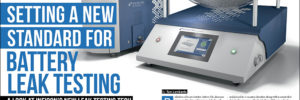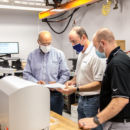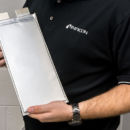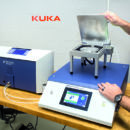Defective cells can shorten battery life, decrease range, and lead to safety issues. A leaky cell housing, one common failure mode for Li-ion batteries, can allow ambient humidity to come in contact with the electrolyte, triggering an exothermic (heat-releasing) chemical reaction.
Currently, the common practice in the battery manufacturing industry is to test cell packaging prior to final assembly. For example, to look for defects, a manufacturer performs a helium leak test on the cells before the electrolyte is added. Empty cell cases are filled with helium and placed in a vacuum chamber along with a sensor that detects the presence of leaked helium. If the case checks out, it is filled with electrolyte and shipped.
The problem with this method is that, while helium tests can detect many common leaks in the casing, the test is performed before the cell is fully assembled. The cell can only be filled with electrolyte and sealed after the test is complete, so the sealed fill port is not tested for leaks. Furthermore, the helium leak test cannot be used for pouch cells.
There currently are no reliable tests on which to base leak-detection standards for a full range of soft-pouch, cylindrical or prismatic battery cells in use throughout the industry.
“There currently are no reliable tests on which to base leak-detection standards for a full range of soft-pouch, cylindrical or prismatic battery cells in use throughout the industry,” says Daniel Wetzig, head of leak-detection R&D at INFICON—a specialist in gas analysis technology that designs and produces helium leak testing equipment. “Today’s pressure and helium testing methods are either too slow or unreliable, and also may allow small but significant lithium-ion leaks to go unnoticed.”
Wetzig and his colleague, Maximillian Reismann, authored a white paper, “Methods for Leak Testing Lithium-Ion Batteries to Assure Quality with Proposed Rejection Limit Standards,” which was accepted and published by the SAE in April 2020. The paper points out the need for automakers to maintain high quality and safety standards, making it in their best interest to assure that EV batteries are safe, reliable and long-lasting. It then describes INFICON’s newly-developed non-destructive method for testing all types of Li-ion batteries at the end of the assembly line, either before the first charging or just before they leave the factory. Charged spoke with INFICON engineer and leak detection expert Thomas Parker, to learn more about the new state-of-the-art battery testing method.
Charged: What exactly happens when a cell leak goes undetected?
Thomas Parker:If a cell leak happens, there is a chance that electrolytes could leak out of the cell, which would render the cell useless.
However, if there is a very small leak, the cell will function for a period of time. Over that period of time, the electrolyte might not leak out, but water vapor (humidity) will ingress into the cell to cause that exothermic chemical reaction.
You may remember, several years ago, the auto industry had a big recall of airbag inflators. At first, airbag inflator recalls were limited to places like Florida—high-humidity environments—but then they slowly expanded the recall nationwide. The reason they started with high-humidity environments was because water vapor was creeping into those leaky airbag inflators and reacting with the propellant inside to either spontaneously explode or to over-explode when the airbag deployed during a collision. So, the same thing that disrupted the airbag inflator market—humidity getting into leaking inflators—can happen in the battery market. Humidity gets into battery cells and can cause very negative consequences.
When water vapor reacts with the electrolyte, such as an acidic reaction that’s exothermic, it causes the cells to swell up and generate gas. That can cause a fire, or thermal runaway, where it spreads to the other cells in the battery pack.
So, for several years now, INFICON has been doing helium leak testing of cells for integrity purposes. However, that helium process is done before they put the electrolyte in, and we found that our customers wanted some sort of highly-accurate final end-of-line testing solution. So that after they fill the electrolytes and cap off the fill port, they could do a final test to make sure that the cell is absolutely leak-free. That can’t be done with the helium test method, so we developed a new system.
Charged: Are there other methods used to do leak testing other than the helium vacuum test?
Thomas Parker: Most companies are either doing a visual inspection for things like pouch cells, the helium leak test for rigid cells (prior to electrolyte build), or they’re using an air test method. For the air method, they put the cell into a pressure vessel and they look at the pressure signature over time. If there’s a change, they call it a leak, but there are sensitivity limits with that method.
Charged: How does INFICON’s new leak testing solution work?
Our new gas analysis device looks for the presence of electrolyte material and gives a simple pass/fail result.
Thomas Parker: It’s pretty simple. Part of the unit is based on an existing gas analysis leak detector that’s commonly used to leak-test a refrigerator, home air conditioner, or a car’s AC system. That gas analysis device has been around for several years, but to detect electrolyte, we had to condition the cell sample under certain vacuum pressures so we don’t damage the cell. The operator, or a robot, loads the cell into a chamber, and then the chamber pumps down to a safe vacuum around the cell. Our new gas analysis device looks for the presence of electrolyte material and gives a simple pass/fail result. It’s a straightforward test, it just took a lot of thought and development to adapt the technology to the battery market, because now we needed to detect the presence of liquid electrolyte instead of gases.
As we detailed in our SAE paper, battery cells already filled with liquid electrolyte must be considered differently. With these cells, the electrolyte wets potential leak channels so that parameters such as viscosity, surface tension and surface contact angle between the liquid and the battery wall also must be taken into consideration.
Since a cell contains liquid electrolyte, the classic leak test using test gas cannot be used. Apart from the risk of the liquid blocking the leak channel, it is difficult or even impossible to add test gas to the battery cell.
As we detailed in our SAE paper, battery cells already filled with liquid electrolyte must be considered differently.
Charged: INFICON develops leak tests for many different industries and applications, correct?
Thomas Parker: Yes, INFICON is a publicly-traded Swiss company, and our specialty is gas analysis technology. We utilize our knowledge for leak testing products in the battery market. But we also use the gas analysis technology for semiconductor chip manufacturing, vacuum science—a lot of different markets where people are interested in gas analysis.
I have a mechanical engineering background and an MBA. I’ve been in this industry for 20 years, 15 of them with INFICON.
Charged: You say your new method can detect leaks that are a thousand times smaller than previous methods. Can you explain?
Thomas Parker: Imagine you take a cell and introduce a fabricated known leak—people do this in industry all the time, they’ll fabricate a known leak via different methods, but this known leak is a calibrated lab-certified orifice that leaks a certain size. Often, people will introduce these laboratory-certified known leaks into a part and run it through their process to get a process capability. So, for example, the industry knows how small of a leak you can see with pressure decay test air testing. We took those similar orifices, a thousand times smaller than air tests would be able to see, but our machine was able to see it. It’s really good metrology and repeatability. So, that statement of detecting leaks a thousand times smaller was proven through our engineering test data using known laboratory-certified orifices, or leaks.
Charged: Your equipment for testing prismatic and cylindrical cells is being introduced now, and you’re looking at a different system for pouch cells.
Thomas Parker: Yes. What we launched first is a solution for the rigid cells, and we’re wrapping up beta testing of the flexible membrane chamber for pouch cells. In the next month or so, that flexible pouch test will be commercially available as well.
This is great for the industry, because the flexible pouch cells can’t even be helium leak-tested. They rely on a less accurate pressure decay test or, in most instances, a visual test.
This is great for the industry, because the flexible pouch cells can’t even be helium leak-tested. They rely on a less accurate pressure decay test or, in most instances, a visual test.
They’ll let those pouch cells sit for a couple of days, literally, and if there’s any water ingress, that’s when they see it swell up. So, it’s an operator looking at a cell and saying, “Okay that cell is swelled—scrap it.”
Charged: Once your systems are being produced and used in industry, do you think it’ll be an end-of-line test for every unit, or will this be something that they sample and test in batches?
Thomas Parker: It depends on the application and the customer’s confidence in their yield. So far, people are looking at 100-percent testing, because they want to see where they are in their process, and they want to see where their process capability is, to then do some benchmarks. If they test 100 percent of the line and feel confident in their process, they could then migrate to a statistical batch test where they sample a percentage of the cells in each lot.
Charged: Do you think that, with your new tests available, the industry could begin to adopt quality-control standards for EV batteries?
Thomas Parker: We hope so. Back in April, at the SAE World Congress, we submitted and were awarded publication of a white paper that proposed the need for standards of testing and to what level those standards should be. Right now, in the automotive world, you can pull up SAE J-specs for airbag inflators, fuel tanks, fuel injectors—tried-and-true industry standards. Those are still being developed for the battery market. So that’s something that we’re participating in now, getting that movement out there, having some sort of industry-wide adopted standard for battery leak testing.
Charged: How does that process go, exactly? How do you go from a submitted paper to an industry-wide standard?
Thomas Parker: Last year we submitted an abstract. After the abstract is accepted, then you pull together all your engineering data, the test engineering, the test data, and work on the technical paper explaining the need of the industry. That gets reviewed by the SAE peer committee, and then you address any questions or any expansion of ideas, and so it goes back and forth. It’s a year-long process, so when we were awarded this SAE white paper, we thought it was a pretty good accomplishment.
When SAE selects these white papers to publish, it starts the discussion of how we move forward with this, if there’s some J-specification. Usually, the powertrain committee looks at it and says, “This is an important topic, let’s form a subcommittee and start looking at these details.” That usually takes a year within itself for everybody to review it. Maybe companies do their own test engineering, or maybe pull from their own experience. So, it’s the first step of an SAE committee formation—realizing that this is something that definitely needs to be looked at in detail.
This article appeared in Charged Issue 52 – November/December 2020 – Subscribe now.
Source: Electric Vehicles Magazine






